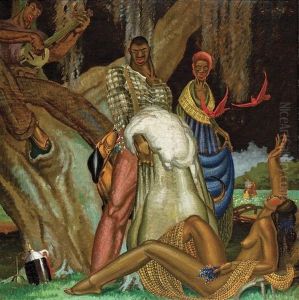Kindred Mc Leary Paintings
Kindred McLeary was an American artist known for his work as a muralist, painter, and teacher, particularly during the 1930s and 1940s. Born on August 5, 1901, in Liberty, Missouri, McLeary was an influential figure in the American art scene, especially within the context of the New Deal art projects. His work reflected a blend of classical and modernist styles, and he often focused on themes of social justice and American life.
McLeary attended the Kansas City Art Institute before moving to New York City, where he studied at the National Academy of Design and the Art Students League. His education was an important foundation for his future work, providing him with both technical skills and exposure to a broad range of artistic philosophies.
During the Great Depression, McLeary became involved with the Public Works of Art Project and later the Federal Art Project, which were part of the New Deal programs established by President Franklin D. Roosevelt. He created several murals under these programs, which were intended to provide work for artists and to bring art into public spaces. Some of his notable murals include those at the Department of the Interior building in Washington, D.C., and the post office in his hometown of Liberty, Missouri.
Despite his success as a muralist, McLeary's life was marked by personal struggles, and he faced difficulties in both his personal life and career. Nevertheless, he continued to teach and inspire a new generation of artists through his work as an instructor at the Art Students League and later at the Colorado Springs Fine Arts Center.
Tragically, Kindred McLeary's life and career were cut short when he died on December 29, 1949, at the age of 48. Although his career was relatively brief, McLeary left behind a legacy that continues to be studied and appreciated by art historians and enthusiasts. His murals and paintings remain a testament to his skill and his commitment to depicting the American experience with authenticity and social consciousness.
